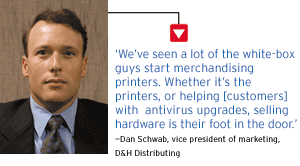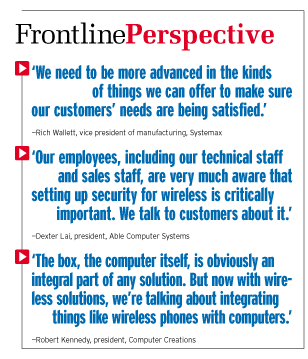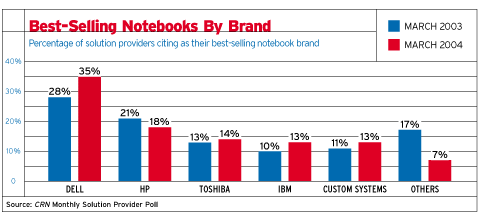Untethered

Published for the Week Of May 17, 2004

any solution providers that build custom systems are breaking free from old, hardware-sales-dependent business models to forge new ones in the face of the challenges and opportunities presented by mobile computing.
As an economic recovery and advancing technology spur sales of wireless notebooks, custom-system solution providers are taking on a wider array of vendors, expanding services and investing in the training needed to move beyond desktop integration to solutions wrapped around mobile computers and packaged with custom servers, wireless networking and digital convergence technologies, system builders and distributors say.
“The box, the computer itself, is obviously an integral part of any solution,” said Robert Kennedy, president of Computer Creations, a Dayton, Ohio-based custom-system solution provider. “But now with wireless solutions, we’re talking about integrating things like wireless phones with computers. There are a lot of vertical applications that are beginning to use bar coding. There are so many extenuating peripheral devices and software that connects everything.”
Systemax, one of the country’s largest system builders and the owner of Infotel and TigerDirect, increased sales by 7 percent to $1.65 billion last year and turned a 2002 loss into a 2003 profit while broadening its notebook, wireless and peripheral product lines across all of its business units, the company said.
| AD | |
|---|---|
| id | unit-1659132512259 |
| type | Sponsored post |

“We need to be more advanced in the kinds of things we can offer to make sure our customers’ needs are being satisfied,” said Rich Wallett, vice president of manufacturing at Systemax, Port Washington, N.Y. “It’s not necessarily the hardware, but the advancement of business.”
In this untethered world, customers are turning to custom-system solution providers to make sure everything connects. But they aren’t the only ones. Hardware and software vendors and wireless service providers are turning to the custom-system channel as well.
D&H Distributing, Harrisburg, Pa., earlier this year signed a deal with Symantec, Cupertino, Calif., to provide an OEM version of its antivirus software to the distributor’s system-building customers. Computer Associates International, Islandia, N.Y., also began providing rebates, sales incentives, customized marketing campaigns and free technical support to system builders through D&H.
Other vendors tapping into the distributor’s custom-system channel include PowerQuest, NEC-Mitsubishi, Cyber Power and Hewlett-Packard, to name a few.
“The peripheral, software and networking companies were never doing business with [system builders],” said Dan Schwab, vice president of marketing at D&H. “These vendors have stepped to the forefront.”
CA is moving even more aggressively into the custom-system channel with plans this month to launch an initiative to get system builders to bundle BrightStor storage, eTrust security and Unicenter systems and network management software with custom-system solutions.
“If they are going to bundle stuff for white-box builders to help the end-user experience, I’m all for it,” said Tom Derosier, co-owner of CPUGuys, a custom-system solution provider in Hanson, Mass., who envisions using Unicenter agents on custom systems so he can monitor and upgrade them with antivirus patches.
Meanwhile, HP, Palo Alto, Calif., began an aggressive recruitment of system builders for its peripherals, software and printer businesses, meeting with groups throughout North America in settings such as the Intel Solution Summit earlier this year. There, HP executives met with several dozen of Intel’s larger and more active system builders, offering extra rebates of up to 5 percent on several printer lines, free technical support, merchandising tools and points toward discounts on future purchases.
“We’ve seen a lot of the white-box guys start merchandising printers,” Schwab said. “Whether it’s the printers, or helping [customers] with antivirus upgrades, selling hardware is their foot in the door. Their customization and flexibility allows them to get further.”
Wireless service providers also see an opportunity to sell services through the custom-system channel. Intel has played a role over the past year in recruiting Sprint, AT&T Wireless and SBC Communications, among other service providers, to offer incentives to Intel Premier Providers to bundle wireless services with mobile computing systems.
For many solution providers, wireless custom notebooks have become a big driver of the changes. The CRN Monthly Solution Provider Survey shows that the number of solution providers citing custom notebooks as their best-selling brand rose to 12 percent during the first quarter, up from 9 percent a year ago, and about double what it was just two years ago.
That is a significant shift that could accelerate this year as Intel continues to push its Centrino platform into the system builder channel. Intel is projecting that its North American system builder channel will triple its sales of mobile notebooks this year.

While a rising number of solution providers are reporting that custom notebooks are their best-selling brand, the percentage assembling their own notebooks remains relatively small. A poll by CRN in March indicated 12 percent of solution providers were assembling notebooks, compared with about one-third that were building servers and desktops.
A larger number, about 40 percent, reported they were sourcing custom notebooks from system builders. Whether more solution providers begin assembling their own custom notebooks as platforms and components become more available remains to be seen.
But many expect to be selling more wireless notebooks, custom or otherwise. According to CRN research, optimism among solution providers reached an all-time high in February, with the brightest glow around mobile computing sales.
“This year, starting in February, we started seeing business pick up. I think there’s still a lot of growth potential [in mobile systems],” said Dexter Lai, president of Able Computer Systems, a Kirkland, Wash.-based system builder and solution provider that builds custom notebooks. “On the [custom] notebook side, there is an increase in wireless sales,” he said.
The result is that a multitude of changes are working their way into the custom-system solution provider’s business model. For many, the increased focus on wireless and outside-the-box solutions has resulted in changes to the top line.
Lai said his employees are finding themselves in conversations with customers that rarely took place in the last business upswing. “Our employees, including our technical staff and sales staff, are very much aware that setting up security for wireless is critically important,” Lai said. “We talk to customers about it.”
That also leads to discussions with even the smallest business about hacking, virus protection and data integrity issues, he said.
“I would say that, as a percentage of revenue, services are definitely growing quite a bit,” said Mike Wurnitsch, CEO of DataConnect Solutions, a custom-system solution provider in Hayward, Calif. “When the company was started, we were primarily a product reseller as opposed to services. Now, we’re flipping to services being a bigger part.”
And just in time, too. Wurnitsch and other system builders have long known that hardware margins would continue to shrink, and wireless integration is bringing in new sources of revenue.
“Services come into play with wireless technology,” Wurnitsch said. Solution providers need to secure wireless networks against unauthorized access and conduct site surveys to properly configure wireless networks. “Especially bigger networks like a campus environment, that’s definitely a driving force,” he said.
Another impact on custom-system solution providers is the need to increase investments in training to boost competencies in wireless networking, security, digital convergence and business process re-engineering.
Staying ahead of the curve isn’t cheap. The proliferation of mobile devices tied to custom-built PCs as well as custom-built servers has required system builders to re-examine their needs, their customers’ needs and what they have to do to remain cutting-edge, solution providers say.
Last year, DataConnect spent an additional $25,000 on training for its 14-employee business. Wurnitsch said his training budget increased by 60 percent year over year, and that it was broad-based—reflecting the new, solution-based opportunities his company has found.
“A good amount of that training is application-specific training,” Wurnitsch said.

\
Computer Creations has also been increasing its investment in education and training. “We have a commitment for education and keeping up with the technology,” Kennedy said. “Even if you hover around basic, core competencies, it takes an investment.”
But there has been a pay-off. Computer Creations last fall raised its billable rates for service, support and integration services 20 percent to 30 percent, Kennedy said. And business did not appear to suffer.
After giving customers notice and explaining the reasoning behind the increases, Kennedy said most customers accepted the rate changes. “It was the first time we raised them since 1998, and we think it’s been pretty well-received,” he said.
“When we did it, we did it with the idea of helping our bottom line,” Kennedy said. “If you can improve your bottom line, you’ve got room to do things such as training and research and development.”
And with newer, and quickly adopted technologies such as wireless notebooks and wireless networking, it’s money well spent, he said.